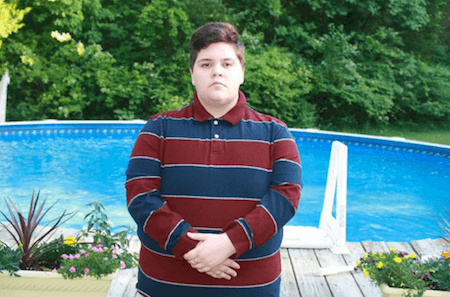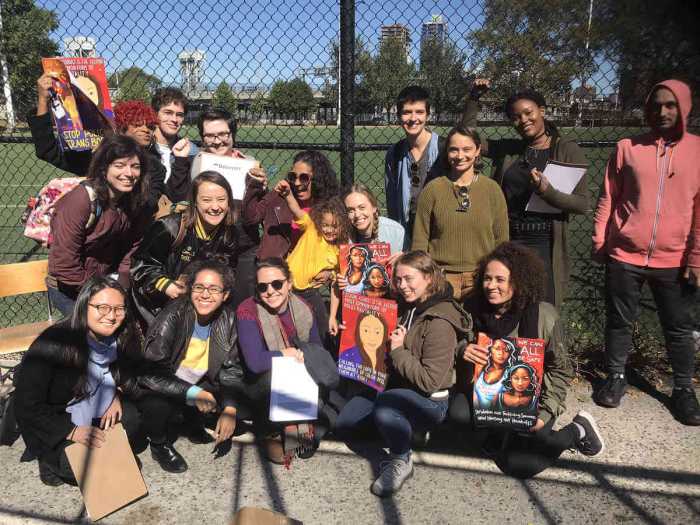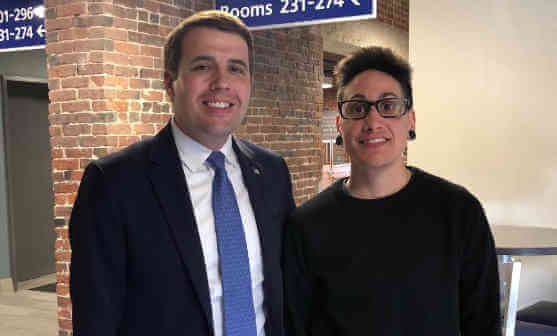Attorney General Jeff Sessions, in a late night announcement on February 10, said the Trump administration is backing off its advocacy for transgender students.SESSIONS.SENATE.GOV
In a clear and disturbing sign that the Justice Department is in full retreat from the Obama administration’s advocacy for transgender students — and trans people, generally — Attorney General Jeff Sessions last Friday evening, just one day after being sworn in, notified the Fifth Circuit Court of Appeals the department was no longer interested in pursuing a scheduled February 14 hearing to challenge a federal district court’s nationwide injunction on a Department of Education guidance requiring public schools to allow trans students access to bathrooms consistent with their gender identity.
The injunction came in a case brought by the State of Texas, joined by 10 other states, resisting the Obama administration policy. The Justice Department, under former Attorney General Loretta Lynch, had sought the hearing to limit the scope of the injunction while the Obama administration appealed the August 22 order from US District Judge Reed O’Connor of the Northern District of Texas in Wichita Falls.
In May of last year, the Justice Department and the Department of Education, interpreting federal education law forbidding sex discrimination to protect against gender identity discrimination, informed all schools receiving funding from the DOE that they would be required to implement the bathroom access policy.
Withdrawing from trans student hearing, new AG shows Obama's advocacy set for reversal
That policy had earlier been spelled out by the Obama administration in a filing in a case brought by a transgender high school student in Virginia, Gavin Grimm, who sought to use the boys’ room at his school. The Fourth Circuit Court of Appeals, in Richmond, ruled that federal courts should defer to the administration’s rule-making on the issue, and the Supreme Court has scheduled arguments in that case for March 28.
The Fourth Circuit’s ruling did not state that the Obama administration’s policy was the correct interpretation, but rather that it was a reasonable interpretation and that it therefore deserved deference from the court. Should the Trump administration formally change its interpretation, the Virginia school district, perhaps bolstered by a friend of the court filing from the Justice Department, could argue that no policy now support’s Grimm’s position or that the issue should be sent back to the Fourth Circuit for further consideration. In either event, what had been a claim backed by a favorable appeals court ruling and a friendly administration is now likely to arrive at the Supreme Court looking very different.
In response to Sessions’ action on February 10 and Education Secretary Betsy DeVos’ refusal during her confirmation hearings to commit to maintaining the guidance developed by the Obama administration, four leading advocacy groups — the National Center for Transgender Equality, GLSEN, the Human Rights Campaign, and the National Women’s Law Center — sent a February 13 letter to the two cabinet members urging them to follow the former administration’s policy.
In the letter, the groups argued, “These guidance documents, addressing important issues such as sexual violence prevention and response, bullying and harassment, and the needs and rights of transgender students, provide practical answers to schools on issues they face every day. Each of these guidance documents is based on years of careful research to accurately reflect a substantial body of case law and proven best practices from schools across the country. Most importantly, these guidance documents have been instrumental in providing schools with the tools they need to protect the health, safety, and educational opportunities of millions of students.”
Asserting a position that had become standard throughout the Obama administration — that transgender people are protected from discrimination by sex discrimination provisions in federal law — the letter stated, “The Departments’ guidance documents help educational institutions understand and comply with the law. Under Title IX [of federal education law], all forms of gender-based discrimination are prohibited unless specifically exempted by statute.”
The groups pointed to statistics showing that 56 percent of girls and 40 percent of boys in the nation’s middle and high schools reported they have been sexually harassed by peers and that two-thirds of transgender students say they have been harassed.
During the Obama administration, the Equal Employment Opportunity Commission (EEOC) — an independent agency whose members are appointed by the president and that currently has a 3-1 Democratic majority with one vacancy — engaged in affirmative litigation to establish judicial precedent for the view that both gender identity and sexual orientation are protected categories under sex discrimination provisions in a variety of federal laws.
Gavin Grimm’s effort to access a bathroom consistent with his gender identity is scheduled to go before the Supreme Court on March 28. | ACLU.ORG
The EEOC’s advocacy is continuing, at least for now — though Trump has the ability to gain a majority of appointees by July of this year. Last Friday, the EEOC signaled its independence from the new administration by filing an appeal before the Sixth Circuit in a case where a funeral home fired an employee, Aimee Stephens, who had transitioned from male to female.
Beyond the advocacy by the Obama administration and the EEOC, progress on gay and lesbian rights as well as transgender rights has also been made through significant federal court rulings. Both circuit and district courts in many parts of the country have now found gender identity protection in cases under the Violence against Women Act and the Equal Credit Opportunity Act, as well as Title VII of the 1964 Civil Rights Act. In an important breakthrough in 2011, the Atlanta-based US Court of Appeals for the 11th Circuit ruled that discrimination against Vandiver Elizabeth Glenn, a transgender Georgia state employee, violated the 14th Amendment’s Equal Protection Clause. The same standard used for sex discrimination claims should be applied to gender identity claims, that court found.
On November 30 of last year, the full Seventh Circuit Court of Appeals, seating en banc, took up a lesbian discrimination claim brought by Kimberly Hively against Ivy Tech Community College in South Bend, Indiana, in an historic reconsideration of its precedent that the sex discrimination ban in Title VII does not apply to sexual orientation discrimination claims.
Both the New York-based Second Circuit and the Atlanta-based 11th Circuit have recently heard oral arguments about whether sexual orientation discrimination claims can be brought under Title VII, but the Seventh Circuit will likely be the first to issue an en banc opinion on the subject. If the court rules in favor of Hively, the college will have the option of filing a petition with the Supreme Court to review the case. Such a decision by the Seventh Circuit would create a split among the federal circuit courts on a question of national importance, and the Trump administration would face the question as to whether the EEOC’s current participation in the case on Hively side would be reversed. Sessions’ action last week suggests that would happen.
As the prospective circuit court split on the issue of sexual orientation discrimination indicates, on the question of whether LGBTQ people are protected by sex discrimination provisions of US law, the federal courts are by no means of one mind — as they were quickly becoming on marriage equality in the months leading up to the 2015 Supreme Court ruling.
Judge O’Connor in Texas followed up his nationwide injunction on the transgender student guidance with a December 31 injunction, also nationwide, on interpreting the Affordable Care Act’s sex discrimination protections to extend to discrimination based on gender identity. It’s noteworthy, however, that as the only federal judge in the Wichita branch of the court, O’Connor’s court has become the go-to venue for those looking to stall or reverse progress on LGBTQ legal claims.
Sessions’ action last week was decried loudly at the February 11 Human Rights Campaign Greater New York Dinner, and at the Grammy Awards the following night, transgender actress Laverne Cox, told the millions watching nationwide, “Everyone, please Google ‘Gavin Grimm.’ He’s going to the Supreme Court in March. Hashtag ‘Stand with Gavin.’”





































